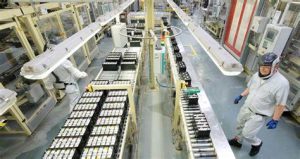The Story
Johnson Controls Inc. (JCI), a global leader in automotive lithium battery production had ambitious and aggressive global footprint plans for rolling out custom built manufacturing plants over a period of several years. Achieving this goal on time, specifically in China, meant hiring MPKi and urgently mobilizing our project teams from 6 countries across 3 continents within a matter of weeks. With our help, JCI delivered their initial footprint goal in China of providing lithium batteries to the domestic EV market on-time and on budget, along with the hiring, training, and retention of a localized team to ensure the ongoing sustainable operation of the plant.
The Situation
Johnson Controls Inc. (JCI) are a well-established and proven global leader in the production and supply of lithium batteries worldwide including to the automotive industry. As part of their global manufacturing footprint expansion plan, they were in the process of building a state-of-the-art lithium battery plant on the outskirts of Shanghai, China which would be used to supply the domestic Chinese electric vehicle market.
Prior to engaging MPKi to support the initiative, JCI already had an active project team made up of internal resources from North America and Asia. The purpose of this team was primarily to ensure the oversight and project management of the factory build in Shanghai. While the timeline of the new plant was on schedule, it became apparent to JCI that due to internal resource constraints both in Asia and North America, that they needed external support to setup a smaller pilot facility in Asia that would be used to start hiring and training the initial tranche of local resources to work at the larger facility once it had been completed and commissioned. While the overall project and some associated mini projects were all on track, one thing was clear: the staffing and training of the start-up team was not concretely factored into the overall project plan. This left the project at risk of delay in terms of when the newly commissioned plant would start and ramp-up production of the relevant lithium batteries.

Our Approach
The initial stage of the project began with an intensive 3-day fact-finding mission and workshop at JCI flagship Lithium factory in Flint, Michigan. The goal was to jointly determine along with JCI what the major gaps were in the overall project and where and how MPKi could add the most value and help JCI plug the imminent gaps and deliver longer term value.
It was very quickly determined that it was not possible to kick-start a project without creating a highly skilled and closely integrated team combining members of both JCI and MPKi. This requirement became apparent very quickly due to the complexity of lithium batteries and specific requirements of setting up what was defined as the “scope” of the project.
The next move was to create a very focused definition of roles and responsibilities across the joint JCI and MPKi project teams and for each of the organizations to identify and appoint team members to the project. This task was made all-the-more difficult by the aggressive timeline to start the project urgently as well as deliver the project in what would be considered highly challenging timeline.
Within a matter of days, we identified the MPKi team which consisted of members from 6 countries, and subsequently mobilized them to attend a project meeting at Flint, Michigan in less than one week. The team was then divided into various sub-project teams with some of those teams beginning an immediate intensive training period at the JCI facility over the course of 2 – 3 months, while other MPKi members located immediately to Shanghai, China.

Our Recommendations
The Results